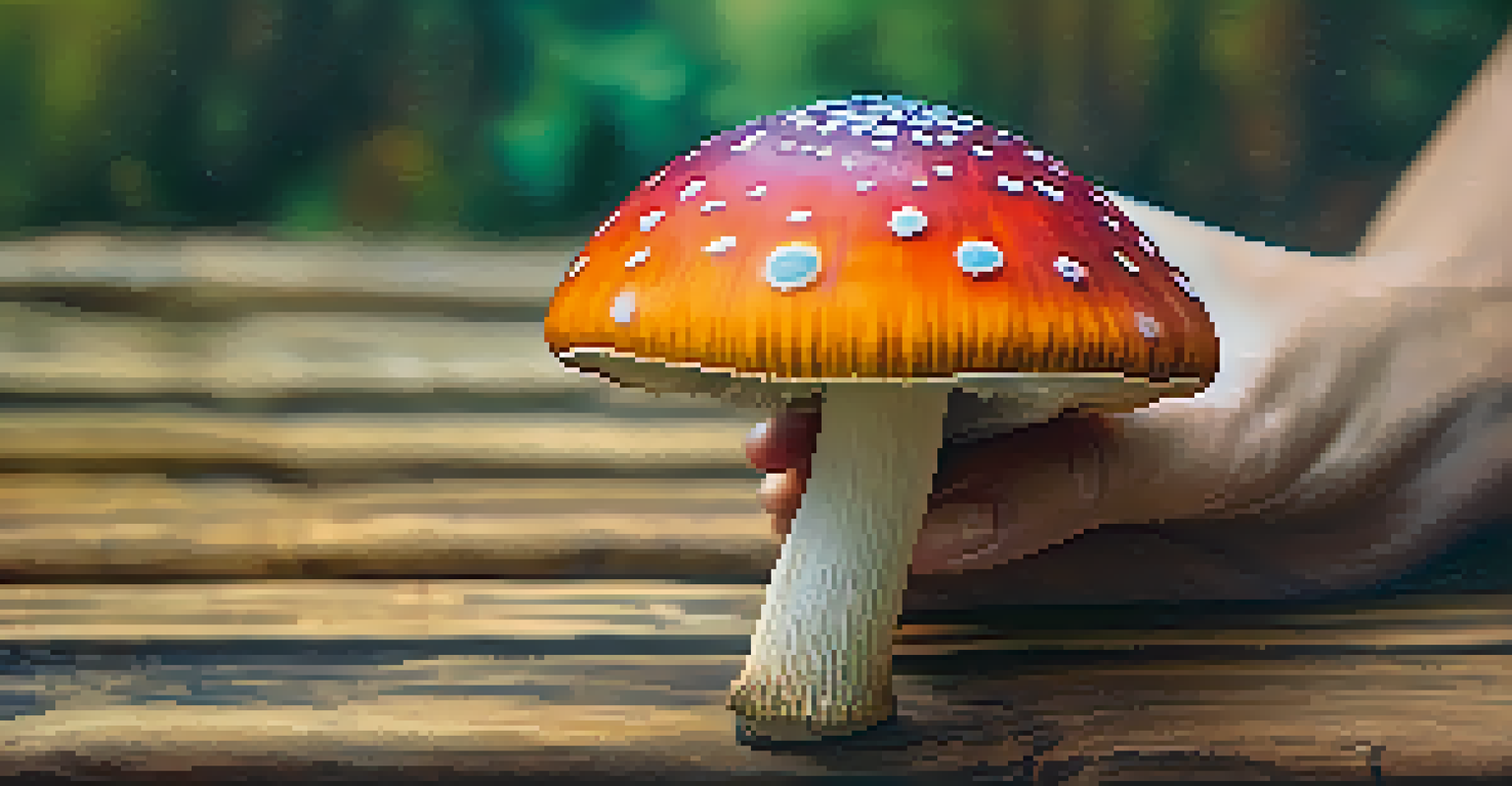The Transformative Effects of Entheogens on Self-Identity

Understanding Entheogens: More Than Just Psychedelics
Entheogens, often known as psychedelics, are substances that can induce altered states of consciousness. These include plants like ayahuasca and psilocybin mushrooms, which have been used in spiritual rituals for centuries. Unlike recreational drugs, entheogens are often used with the intent of exploring the self and the universe, leading to profound personal insights.
Psychedelics can help us see ourselves in a new light, revealing insights that can lead to profound personal transformation.
When people engage with entheogens, they often report experiences that challenge their conventional understanding of reality. This shift is not just about feeling different but can lead to lasting changes in how one views themselves and their place in the world. The journey can be both enlightening and intimidating, as it often forces individuals to confront parts of themselves they may have ignored.
Ultimately, understanding entheogens requires a shift in perspective. Instead of viewing these substances purely as drugs, considering their historical and cultural significance can enrich our understanding of their transformative potential.
The Connection Between Entheogens and Self-Discovery
Many individuals turn to entheogens in search of deeper self-awareness or resolution of personal issues. The experience can act as a mirror, reflecting back aspects of oneself that may be hidden or suppressed. This can be a liberating journey, opening up pathways to understanding emotions, relationships, and life choices.

For instance, a person struggling with anxiety might find that an entheogenic experience allows them to reframe their fears, viewing them through a lens of acceptance rather than avoidance. This shift can lead to significant breakthroughs in how they handle stress and engage with the world around them.
Entheogens as Tools for Self-Discovery
Entheogens can reflect hidden aspects of oneself, leading to deeper self-awareness and personal growth.
These experiences often foster a sense of interconnectedness, not just with oneself but with others and the universe. This broader perspective can lead to a more compassionate understanding of oneself, thereby enhancing self-identity.
Navigating the Healing Potential of Entheogens
Entheogens have been hailed for their potential therapeutic benefits, especially in mental health. Research suggests that substances like MDMA and psilocybin can help treat conditions such as PTSD and depression. This therapeutic use is often accompanied by a deep dive into one's psyche, allowing for healing and personal growth.
The experience of entheogens can act as a catalyst for self-discovery, offering a glimpse into the interconnectedness of all things.
The process can be challenging, as it may unearth painful memories or traumas. However, many find that confronting these issues in a supportive environment can lead to profound healing. It's essential to approach this journey with intention and care, ideally under the guidance of trained professionals.
Moreover, integrating these experiences into everyday life is crucial. Many who undergo this journey find themselves reflecting on their insights long after the experience, leading to ongoing personal development.
Cultural Perspectives on Entheogens and Identity
Entheogens have played significant roles in various cultures throughout history, often intertwined with identity and spirituality. Indigenous cultures have used these substances in rituals to connect with spirits and ancestors, reinforcing communal bonds and individual identities. This cultural context is vital to understanding the broader implications of entheogen use.
In modern society, as more people explore these substances, there's a growing conversation about their legitimacy and role in self-exploration. This shift can challenge societal norms and expectations, prompting individuals to rethink what it means to be themselves in a rapidly changing world.
Therapeutic Benefits of Entheogens
Research shows that entheogens like psilocybin can aid in the treatment of mental health conditions such as PTSD and depression.
By learning from these cultural practices, we can gain insights into how entheogens might enhance our understanding of identity and community, emphasizing the importance of context in these transformative experiences.
Personal Narratives: Stories of Transformation
Personal stories can be powerful testimonials to the transformative effects of entheogens. Individuals often share experiences of profound shifts in perception, self-acceptance, and clarity about their life paths. These narratives highlight the unique ways entheogens can catalyze change, offering a glimpse into the potential for personal growth.
For example, a person may recount how a single experience with ayahuasca led them to reconcile with a long-buried trauma, leading to a newfound sense of purpose and direction in life. Such stories can inspire others who may be seeking similar breakthroughs.
These transformative journeys not only change individuals but can also ripple out to affect communities. As people reclaim their narratives, they may inspire others to embark on their own quests for identity and understanding.
The Risks and Responsibilities of Using Entheogens
While the potential benefits of entheogens are significant, it's essential to recognize the risks involved. Not everyone will have a positive experience, and for some, these substances can exacerbate mental health issues or lead to challenging psychological experiences. It's crucial to approach their use with caution and respect.
Setting, mindset, and support are critical factors in determining the outcome of an entheogenic experience. Creating a safe environment and having a trusted guide can help mitigate risks and enhance the potential for positive transformation. Education about these substances can empower individuals to make informed choices.
Cultural Significance of Entheogens
Understanding the historical and cultural contexts of entheogens enriches their potential for enhancing personal and communal identity.
Ultimately, understanding the responsibilities that come with using entheogens is vital. This includes being aware of one's mental health, knowing the legal implications, and respecting the cultural significance of these substances.
Integrating Entheogenic Experiences into Daily Life
After experiencing the transformative effects of entheogens, many individuals face the challenge of integrating those insights into their daily lives. This process can involve reflecting on the lessons learned and finding ways to apply them in practical situations. Journaling, therapy, or sharing with a community can aid this integration process.
For example, someone who gained a deeper understanding of compassion during their experience might seek to practice empathy in their relationships. This application of newfound insights helps to solidify the changes in self-identity and behavior, ensuring that the benefits extend beyond the experience itself.

Moreover, creating a supportive environment can enhance integration. Surrounding oneself with understanding friends or communities can provide the encouragement needed to continue on the path of self-discovery and growth.